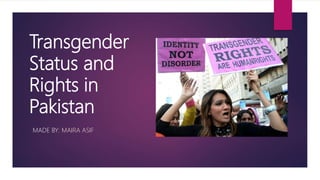Transgender status and rights in Pakistan
- 1. Transgender Status and Rights in Pakistan MADE BY: MAIRA ASIF
- 2. Definition ’üĄ Transgender: It is an umbrella term to refer to all people who do not identify with their assigned gender at birth ’üĄ Transgender people are individuals of any age or sex whose appearance, personal characteristics, or behaviours differ from stereotypes about how men and women are ŌĆśsupposedŌĆÖ to be. Transgender people have existed in every culture, race, and class since the story of human life has been recorded.
- 3. Trans History ’üĄ During the Moghul rule of the Indian subcontinent, they enjoyed respect as trustworthy royal insiders because they were seen as nonthreatening to power holders. They were the protectors of female quarters in courts. They were advisers on political councils and privy to intelligence information, and even seen as holy bridges to God. ’üĄ British colonial law of the 19th century and the later rise of Islamic fundamentalism transformed their status entirely. Under the British, the 1860 Penal Code punished sodomy with a prison sentence. The first Criminal Tribes Act of 1871 categorized transgender people as members of a ŌĆ£criminal tribe.ŌĆØ The latter legislation was meant to punish those who were ŌĆ£habitually criminalŌĆØ due to their genetic makeup (including thieves, murderers and prostitutes). Then, the low status of khawaja siras was ossified through the then President Muhammad Zia-al-HaqŌĆÖs ŌĆ£shariazationŌĆØ of the country, starting in 1977. The impact of shariazation plagues todayŌĆÖs khwaja siras still.
- 4. Status of Trans in Pakistan ’üĄ Transgender referred as khusra in Pakistan, the word khusra is associated with impotence, incompetence, and powerlessness. ’üĄ Reflects a group of people who enjoys the least amount of respect or rights in Pakistan. ’üĄ Due to the controversial nature and typical mindset of people, the subject of Transgender rights in Pakistan is not even discussed in sophisticated circles. ’üĄ Most people do not even consider them as a part of their community. ’üĄ Massive rejections are often faced by transgender in almost all the parts of Pakistan. ’üĄ Transgender are ridiculed and insulted. Popular TV shows, such as Khabarnaak and Khabardaar, make cruel jokes against transgender community. One of these shows is headed by a lawyer licensed to practice before the high courts of Pakistan.
- 5. Rights for TG people ’üĄ There is no quota reserved for the TG population in public sector jobs at the federal or provincial levels. ’üĄ Right to equality ’üĄ Prohibition of discrimination on the ground of religion, race, caste, sex or place of birth. ’üĄ Right to privacy and personal dignity as any ordinary citizen ’üĄ Prohibits trafficking in human beings as beggars and other similar forms of forced labour and any contravention of these provisions should be an offence punishable in accordance with law.
- 6. Problems Faced by Trans ’üĄ Discrimination- no access to public spaces, health care, family, unemployment ’üĄ Lack of educational facilities ’üĄ Homelessness- families do not accept them ’üĄ Lack of medical facilities: like HIV care and hygiene, depression, hormone pill abuse, tobacco and alcohol abuse ’üĄ Problems related to marriage and adoption. ’üĄ The Pakistan Supreme Court compares transgender persons with ŌĆ£disabled personsŌĆ£ and articulates their gender status as ŌĆ£gender disorder.ŌĆØ
- 7. In a widely publicized case in May 2016, Alisha a 23-year-old transgender activist, was shot eight times in Peshawar, and died in hospital while staff debated whether to put her in the male or female ward.
- 8. Statistics ’üĄ NGO based in Islamabad. The study found that 30% of its respondents had attended schools till primary level, 23% till secondary level and 7% percent till high school or college level. The remaining 40% never went to school ’üĄ In the survey held for the UNAIDs 2014 report, around 70% TG sex workers reported that they were living at deras, and the rest lived independently or with their families. In contrast, the survey conducted by PunjabŌĆÖs Social Welfare Department found a completely different status of residence: 45% were found living independently, 35% at deras and 19% with their families ’üĄ Consequently, most of these individuals have no other option, but to make their living by singing and dancing alongside the road or in private parties. Additionally, transgender are usually not encouraged to live amongst regular communities. They are bound to establish their own colonies outside of regular communities.
- 9. ’üĄ Trans Action Alliance/Blue Veins have documented 46 killings of TGs and 300 violent attacks on them across KP from January 2015 to July 2016. ’üĄ Percentage of violence reported every year forced sex is 46%; physical abuse is 44%; verbal abuse is 56%; blackmail for money is 31%; and threat to life is 24%. ’üĄ In Punjab KSS documented 70 instances of domestic abuse in 2015. No specific data on murders, violent assault or domestic abuse was available from any Sindh- based organization.
- 11. Trans in Islam ’üĄ The QurŌĆÖan is clear on genetic determinations by pointing out that Allah is the ŌĆ£One who shapes you in the wombs as He pleases.ŌĆØ (QurŌĆÖan 3:6). All shapes, that is, all physical traits including sexual characteristics and inclinations of a human being, come with the pleasure and permission of Allah.ŌĆØ Every child ŌĆö male, female, or transgenderŌĆöhas the equal blessings of God and there is no justification for parents, courts, or governments to engage in gender-based ill- treatment.
- 12. Rights they deserve and should get ’üĄ Legal Recognition for Third Gender ’üĄ Public Health and Sanitation ’üĄ Socio-Economic Rights ’üĄ Stigma and Public Awareness
- 13. Reforms to improve their status ’üĄ Legal Measures ’üĄ Police Reforms ’üĄ Social awareness ’üĄ Social acceptance















